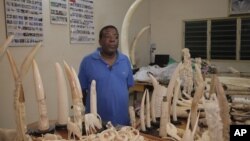DAKAR —
The small West African nation of Togo made its first major arrest this week in the fight against what activists say is a burgeoning illegal ivory trade. The suspect, 58-year-old Emile N’Bouke, has allegedly been active for decades in a trade that contributed to the deaths of more than 10,000 African elephants.
N’Bouke was widely known as “The Boss”. For nearly four decades, activists said, he operated out of a small shop in Togo’s capital, Lome, arranging deals with clients in Asia and potentially the United States.
That came to an end on Tuesday afternoon, when authorities arrested him at his shop in an operation that uncovered more than 700 kilograms of ivory products.
How he was caught
N’Bouke’s arrest was spurred by an investigation begun late last year by the Last Great Ape Organization, which pushes for the enforcement of wildlife laws in West and Central Africa. The organization works in six countries, including those where elephants are poached, such as Cameroon and Democratic Republic of Congo.
It also works in transit countries such as Togo and Guinea, where ivory is shipped to global markets.
Ofir Drori, the organization’s founder, said he is convinced that by focusing on transit countries, officials can do much to curtail the slaughter of elephants in Africa because high-profile traders are the ones who are financing poaching activities.
“We need to focus on the big traffickers, not just the small poachers. Small poachers are activated by those big traffickers, and we need to have this kind of arrest, this kind of operation, all over Africa,” he stated.
Crackdown
Environment Minister Dede Ekoue said Togo’s government is committed to cracking down on the illegal ivory trade. But she adds it will require “global resources,” and that it would like to partner with countries, such as the United States, that have expertise in tracking illicit shipments.
Drori said he believes the arrest of “The Boss” could lead to progress on cases against other players in the industry. “There’s already a huge amount of information that comes out of this investigation -- different bank accounts, different collaborators elsewhere. So they are doing very good work. And we’re optimistic as to what can come out of this beyond just the arrest of a big ivory trafficker,” he said.
N’Bouke claimed after his arrest that all of his work was legal, and that he had a “special permit” granted by the authorities. Although the ivory trade is banned globally, activists said the maximum penalty under Togolese law is just one year in prison.
N’Bouke was widely known as “The Boss”. For nearly four decades, activists said, he operated out of a small shop in Togo’s capital, Lome, arranging deals with clients in Asia and potentially the United States.
That came to an end on Tuesday afternoon, when authorities arrested him at his shop in an operation that uncovered more than 700 kilograms of ivory products.
How he was caught
N’Bouke’s arrest was spurred by an investigation begun late last year by the Last Great Ape Organization, which pushes for the enforcement of wildlife laws in West and Central Africa. The organization works in six countries, including those where elephants are poached, such as Cameroon and Democratic Republic of Congo.
It also works in transit countries such as Togo and Guinea, where ivory is shipped to global markets.
Ofir Drori, the organization’s founder, said he is convinced that by focusing on transit countries, officials can do much to curtail the slaughter of elephants in Africa because high-profile traders are the ones who are financing poaching activities.
“We need to focus on the big traffickers, not just the small poachers. Small poachers are activated by those big traffickers, and we need to have this kind of arrest, this kind of operation, all over Africa,” he stated.
Crackdown
Environment Minister Dede Ekoue said Togo’s government is committed to cracking down on the illegal ivory trade. But she adds it will require “global resources,” and that it would like to partner with countries, such as the United States, that have expertise in tracking illicit shipments.
Drori said he believes the arrest of “The Boss” could lead to progress on cases against other players in the industry. “There’s already a huge amount of information that comes out of this investigation -- different bank accounts, different collaborators elsewhere. So they are doing very good work. And we’re optimistic as to what can come out of this beyond just the arrest of a big ivory trafficker,” he said.
N’Bouke claimed after his arrest that all of his work was legal, and that he had a “special permit” granted by the authorities. Although the ivory trade is banned globally, activists said the maximum penalty under Togolese law is just one year in prison.




